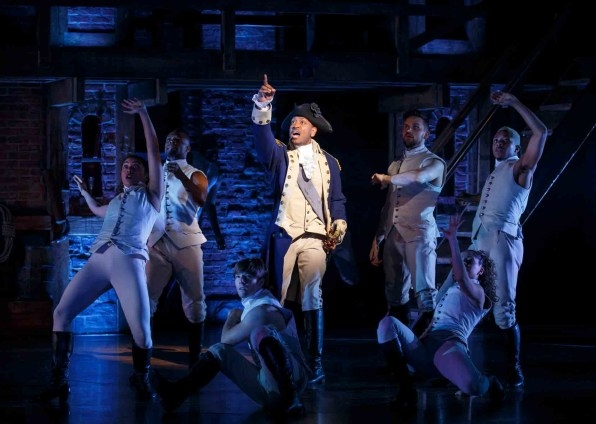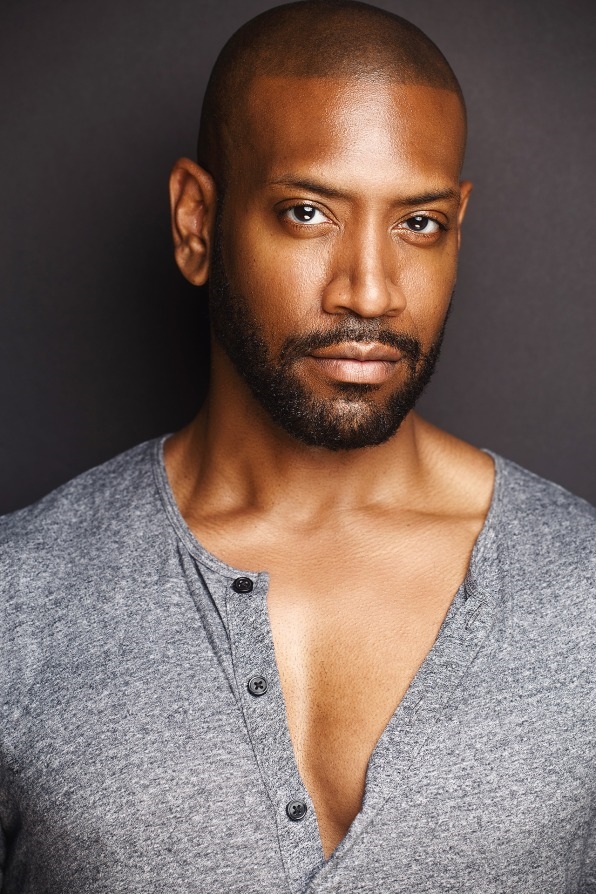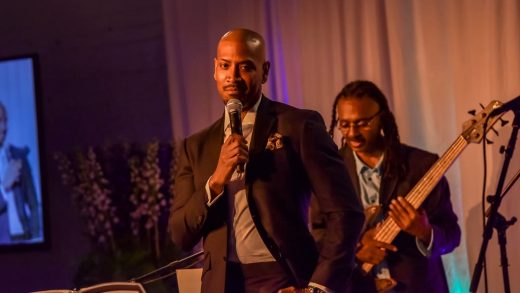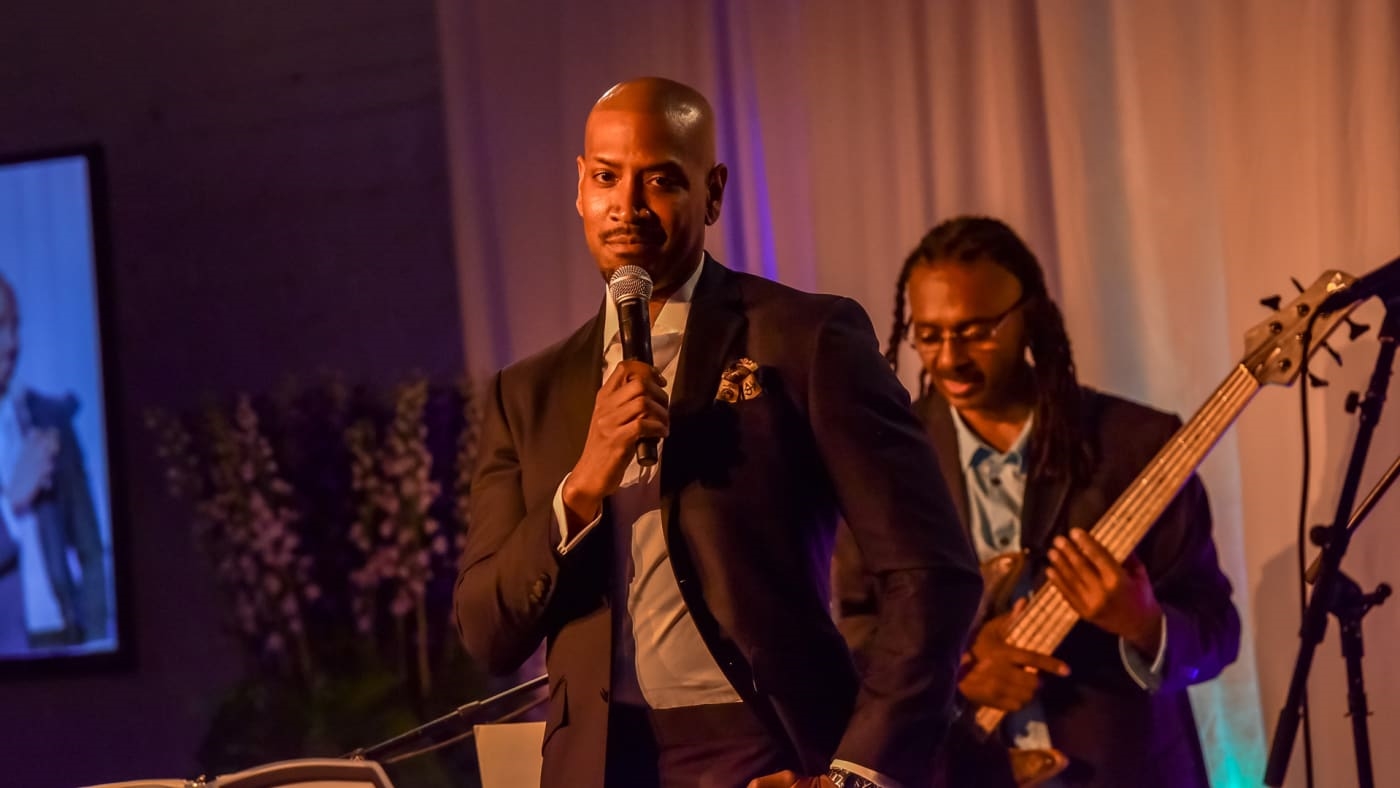“Hamilton” star Bryan Terrell Clark is forging an actor-activist’s path
Since its debut in 2015, Hamilton has continued to be a juggernaut on Broadway, pulling in a total gross of approximately $370 million to date. The diverse cast and expertly penned raps marked a shift not just for Broadway but also for the culture at large.
With so much clout in the zeitgeist, Hamilton has the ability to define an actor’s career–if, in fact, that’s what they want.
“I know it’s going to be a strange thing to say, but Hamilton has become the best bartending gig ever,” says Bryan Terrell Clark, who’s been playing the role of George Washington since January.

Clark has taken full advantage of his downtime from Hamilton to accept other projects in TV (Empire, The New Edition Story, Blue Bloods), film roles (All the Little Things We Kill), and music (writing for actor/singer Jussie Smollett’s debut album). However, he’s at a point in his career where his ambition is outstripping what’s available. Clark is actively positioning himself to be entertainment’s next Renaissance man, not just by creating his own projects, but by making sure those coming next in his footsteps have the tools and mindset to maintain the upward trajectory. It’s a considerable amount of extracurriculars for an actor who’s still making a name for himself. But it’s Clark’s goal to use his platform, no matter the size, to infuse art with a deeper purpose.
“Hamilton‘s not going anywhere–it’s going to be on Broadway forever. But to be honest, I’m much more interested in creating content. I look at the work that Donald Glover is doing, the work that Issa Rae is doing, and I’m deeply inspired,” he says. “I have stories that I want to tell. And I’ve been able to take these meetings with other producers and other creators of content and I’ve been kind of affirmed in a way. They’ve let me know that the ideas that I have are not just valid, but they need to be heard now.”
Clark says those meetings are still in the nascent stages, and while he declines to disclose specifics, he’s leaning toward scripted comedy and unscripted content. What will be universal in whatever he does is a focus on the intersection of art and social consciousness.
“What I realized recently is that I used to think that my purpose was acting or singing or philanthropic efforts. I used to look at my purpose as my vocation and what I’ve learned is that those are just the vehicles,” Clark says. “Those are just the platforms that bring about what my real purpose is, which I think is about reconciliation. It’s about reconciling ourselves to each other and bringing a sense of inspiration and hope to people through the arts that we share.
“To hear a woman say, ‘You’re going to laugh at this, but my child was learning about George Washington in school and because he’s such a fan of Hamilton, he was convinced that George Washington is black’–to know that that the work that we do is allowing minds to view things from a different perspective is really cool as an artist, especially with the racial tension in our country,” Clark continues. “So being in the show becomes a gift because I have a platform by just being who I am. It makes a statement.”
But there’s still work to be done to get more people of color in principal roles on stage. For Clark, it’s a galvanizating position to be in and one that he’s looking to channel toward his own projects.
“I was doing Fences with Laurence Fishburne and I remember one day I got off stage and he said, ‘Bryan, you’re such a smart actor.’ I said, ‘Thanks man!’ He said, ‘you do such good work.’ I said, ‘Thanks man!’ He said, ‘I want you to find a moment in the show where you do nothing.’ And I was like, ‘You mean, like, step out on stage and be really subtle, really simple?’ He said, ‘No, I mean literally do nothing. I want you to just go out there and just see what happens. I want you to understand that your presence in the space is enough,” Clark recalls. “That’s what I experience oftentimes in Hamilton. There’s something about the nature of who I am just playing George Washington in this hit musical that speaks volumes. Now you couple that with my sense of purpose and you couple that with organizations that I partner with and now we’ve got some trouble. Now we can shake some things up.”
Part of that for Clark is his philanthropic fashion brand inDEFINED. Launched last year by Clark and his business partner Robert Raeder, inDEFINED’s mission is to erase the negative labels that society places on marginalized communities. It’s a word they coined to mean “having the freedom to define yourself from within; living without limits, labels, or definitions.”
“As an actor, I feel like oftentimes I’m typecast, and I think that it’s very easy to put people in boxes, and most of the people I meet are way more fascinating than the boxes that have been placed on them,” Clark says. “And so I was trying to find ways to, in a very kind of cool simple way, break the boxes. So how do we break fear? We just draw a line through it. That means I’m not afraid. How do we change hate? We put a line through it. Failure? Put a line through it. Racism? Put a line through it. And we came up with this idea for this cool T-shirt brand.”
In addition to selling T-shirts, the proceeds of which help to fund charitable organizations focused on arts education, Clark also hosts acting and singing workshops for predominantly Latin and African-American high school students in New York City.

“We did acting workshops that were all about how you see yourself, changing the labels, not being defined by where you are and where you come from and what your circumstances are, but defining yourself from within,” Clark says. “We did everything from theater games—I broke out a track and had them write their own raps about the dreams they want to accomplish and the stereotypes and labels they were breaking. And that’s the kind of work that I do on the day off. They’re hand in hand because doing a Broadway show can become monotonous because you’re doing the same thing every day. But when you leave something like that [workshop] on a Monday and come in on a Tuesday to play George Washington, it’s fuel for the fire. So my work as an actor fuels my philanthropic work but my philanthropic work fuels me as an actor.”
“I’ve always had a passion for arts education–it’s the thing that gave me a voice,” Clark continues. “I was a really shy kid and I was going through a lot dealing with a father who was addicted to drugs. The arts came along right around middle school and broke that silence for me. And I went to a performing arts high school and found my voice and found my identity.”
To a certain extent, Clark is still trying establish his identity as an actor. It would be understandable if he chose to put his passion projects on ice to focus on building his cachet with more roles in film and TV. After all, elevating his status as an actor would only give the content he creates and his philanthropy a stronger voice. However, he wants to develop his acting career at his own pace.
“There’s a gift in being hidden on the back side of the mountain. And I know that sounds crazy, but I think a lot of artists want to be seen right away,” Clark says. “And I think that’s the danger sometimes of becoming famous too young, is that you’re seen while you’re still developing. The gift of the time that I have right now in Hamilton and the work that I’m doing is that I get to develop.”
“There’s a lot of people in the industry that have been doing powerful work in the industry and then all of a sudden they’re revealed,” Clark continues. “I’ll give you a great example: Viola Davis. Real actors in this industry, we’ve known about Viola Davis for decades. I’ve never wanted it quick and fast. I’ve always wanted it right. And I think that our industry devours the young because they don’t know who they are yet and they go to Hollywood to become an idea of who they think they are and they become a slave sometimes to what they think people are requiring of them. It’s a very different thing when a person, who is an adult, who knows who they are, gets the platform. That’s powerful. That’s always been the kind of person I’ve always wanted to be.”
Fast Company , Read Full Story
(23)



